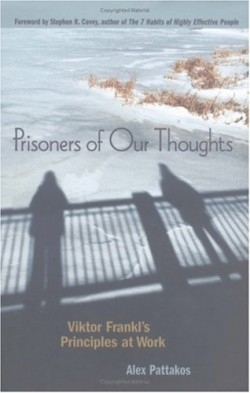It looks like you've stumbled upon a page meant to be read by our code instead of viewed directly. You're probably looking for this page.
Prisoners of Our Thoughts
Viktor Frankls Principles at Work
Thinking “outside the box” takes on new meaning when the box is ones own coffin. The author, former professor of business administration and principal of The Innovation Group, makes that challenge, among others, in this fine tribute to psychiatrist Viktor Frankl (19051997). In chapter six, “Detect the Meaning of Lifes Moments,” an exercise calls for writing “your own eulogy to be read at your funeral.”
Anyone familiar with Mark Twain knows that imagining ones funeral can be exhilarating. A central message in the work of Viktor Frankl urges the cultivation and use of imagination, as he learned to do in the Nazi concentration camps of World War II, where the shadow of death was ever present. Pattakos regards Frankls Mans Search for Meaning as one of the most important books of our time. The two men met in Vienna in 1996, when Frankl encouraged the author to address the arena of work using principles of logotherapy, i.e. the search for meaning.
First among these principles is the freedom to choose ones attitude. In the most discouraging circumstances, humans still have imagination, and the power to use it constructively. This implies more than positive thinking; this kind of imagining requires meaningful commitment, a valued goal, real passion, and perspective. Without emotion and a sense of power, one remains frozen, imprisoned by thoughts. Getting out of this prison is as rewarding as it is difficult; for example, paradoxically, by coming up with a list of ten good things that would result if you died today.
To find meaning in work is to celebrate everything from cleaning a room to creating products that enhance the planet and its inhabitants rather than deplete them. Pattakos shows how dedication and humility combine with delight and caring, whether the concern is delivering the mail or designing an international project. He believes that in this century making a will is becoming more important than making a living. Frankls notion of “paradoxical intention” comes into play: one learns at times to focus off the presumed goal in order to reach it. Similarly, mistakes become inspiring learning experiences rather than useless failures.
“Real cheerfulness is not have-a-nice-day artifice. Its a way of experiencing the present, no matter what the weight of the world or the weather. Cheerfulness celebrates the possibility of meaning around every corner.” So many self-help books are lightweight, yet do not fly; this one, hefty with philosophy, soars.
Reviewed by
E. James Lieberman
Disclosure: This article is not an endorsement, but a review. The publisher of this book provided free copies of the book to have their book reviewed by a professional reviewer. No fee was paid by the publisher for this review. Foreword Reviews only recommends books that we love. Foreword Magazine, Inc. is disclosing this in accordance with the Federal Trade Commission’s 16 CFR, Part 255.
